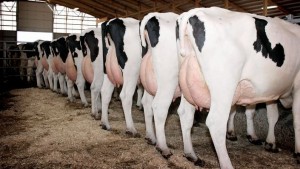Savvy dairymen in Britain may be adulterating the nation’s milk supply with something that looks like milk, tastes like milk, and comes from an animal that moos like a milker, but leaves regulators and ethical arbiters unsure of whether or not to permit its consumption. Here and there around the world, cloned cows and their offspring have quietly found their way into dairy herds and regulators are quite twitchy about the situation. If it comes from a clone, is it milk that’s safe to drink?
 It’s not exactly a fresh concern. Since Ben wrote about his gustatory experience with cloned milk and meat for Wired magazine three years ago, the United States Food and Drug Administration has approved meat and dairy products from cloned critters. The US Department of Agriculture, bureaucratic servant of the big ag biz, has called for farmers to voluntarily keep cloned food products out of the supply chain “so it can manage a smooth and orderly transition to market.” In other words, until the “greed is good” crowd can control cloning operations under the umbrella of amoral corporate agribusiness, the USDA wants to keep the market closed.
It’s not exactly a fresh concern. Since Ben wrote about his gustatory experience with cloned milk and meat for Wired magazine three years ago, the United States Food and Drug Administration has approved meat and dairy products from cloned critters. The US Department of Agriculture, bureaucratic servant of the big ag biz, has called for farmers to voluntarily keep cloned food products out of the supply chain “so it can manage a smooth and orderly transition to market.” In other words, until the “greed is good” crowd can control cloning operations under the umbrella of amoral corporate agribusiness, the USDA wants to keep the market closed.
In the Eurozone, government approval hasn’t been this easily won. Members of the European Parliament (MEPs), sensitive to citizens’ concerns regarding animal welfare, genetic diversity of farm animals, and market conditions in the face of pressure from the global agribusiness giants, maintain a cautious attitude about clone products and other “novel foods.” In July clone products were removed from the “novel foods” category and the European Parliament called for more specific regulation (see Amendment 14). A press release accompanying this action said:
“A clear majority in the European Parliament supports ethical objections to the industrial production of cloned meat for food. Cloned animals suffer disproportionately highly from illnesses, malformations and premature death. MEPs have been calling for proper regulation for years: it’s high time the Commission listened to the European Parliament and citizens on this issue.”
There are now over 6 billion people to feed on the planet earth, and the way things are going there will be nine billion by 2025. Agricultural production on an industrial scale results in a degraded environment and ethical shortcuts that end up poisoning people. I’m thinking of mad cow disease, BSE prions spread through the mixture of brains, bones, and meat in cattle feed. USDA regulation is a sick and twisted example of government bureaucracy cross bred with corporate interests to the detriment of us all. In the case of mad cow disease, US beef producers have been restricted by the USDA from testing their own cattle. Whatever regulations emerge in the USA to control the market for clone sourced food, they will doubtless be as noisome and as ineffective as the regs surrounding animal feeding.
Cross posted at Class War.

